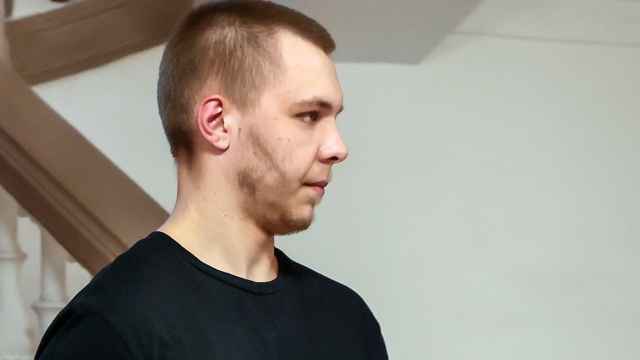If government plans come to fruition, congestion in Moscow will be significantly reduced, thanks to a network of modern transportation hubs to be built using funds supplied primarily by local and foreign private investors.
Despite efforts to improve infrastructure in the nation's capital — which accelerated dramatically after then-Prime Minister Vladimir Putin said it should be a priority — the problem of overloaded public transportation remains, and experts say a key issue is the low level of interconnectivity between the various means of conveyance.
A program has been developed to create 255 transport interchange hubs.
But a new venture to coordinate and improve how key elements of the city's transportation network interact intends to tackle that issue. The city Transportation Department, Moscow Metro, Moscow Ring Railway and a subsidiary of Russian Railways called the Railway Stations Directorate have developed a joint program to create 255 transport interchange hubs, or TIH, in the capital and the surrounding region over the next eight years.
"The idea is to turn railway, subway and urban ground transportation into an easily interchangeable network," Deputy Head of the city Transportation Department Gamid Bulatov said.
New Lines and Hubs
The first goal, to be carried out by the end of this year — is to create 190 simple "Level One" hubs. This involves clearing the area around rail and subway stations of small retail shops and other commercial endeavors, which are often selling their wares without proper authorization, in order to civilize the space. This will involve paving, adding park benches, flowerbeds and other elements. Convenient — and inexpensive — parking for private cars is also foreseen.
Some stations, where several means of transportation come together and the passenger flow is high, will be transformed into multimodal hubs where passengers can change from a train to the subway inside one building. Commercial and retail space is also planned to be under one roof. The architecture of these hubs may vary, but each structure will include a basic set of facilities and services for commuters, which will be determined by the city.
The Moscow Ring Railway will play a key role in this evolution. A railway line circling the city between the third transportation ring and the MKAD, this new network will be converted for passenger use and see 31 hub stations appear by 2015.
Another 42 larger hubs are set to open in the capital over several years, starting in 2014. This project, run by the Railway Stations Directorate, will better connect existing commuter train stations with the metro. The task of creating an additional 90 hubs has been given to the Moscow Metro. The goal is to have a total of 150 to 160 TIHs in the capital by 2020.
While "Level One" interchange nodes will be built primarily using state funds, big hub projects are too much of a strain on the budget.
"The amount of investment needed for these projects is immense, and we do not expect that the Moscow government will be able to handle the financing alone," Gamid Bulatov said.
His estimate is that it will cost at least around 2 billion rubles ($65 million) to build one complex hub. Sergei Pak, the head of RZD Rail Stations Development, a project company for the Railway Stations Directorate, gives a bigger figure. He said 7 billion to 10 billion rubles were needed to complete a multimodal hub.
Footing the Bill
The Moscow Transportation Department consulted Cushman & Wakefield and other experts to develop a formula to fund the hub effort. Investors will be granted rights to develop commercial property inside the hubs in return for the infrastructure construction funding. Once the technical infrastructure is built, such investors will have the right to build and lease out offices, shops, food courts and other profitable business. According to Gamid Bulatov, a return on investment is possible when the area ratio of commercial real estate to infrastructure is, on average, 3 to 1.
This approach will be applied first to hub projects along the ring railway, where land ownership is mostly transparent. The Moscow Ring Railway has accumulated almost all the property in the vicinity of the line and has the right to lease out land out to investors.
The city transportation department estimates that it will be necessary to build a total of 250,000 square meters of infrastructure for the 31 hubs on the ring railway. This means that investors will have an opportunity to build an additional 750,000 square meters of commercial space.
"Different hubs will have different passenger flow, so commercial space will not necessarily be distributed equally. Places with few passengers will see almost no commercial development. In other places the share of commercial space will be much higher," Bulatov said. Investors will be offered lots of 5 to 7 hubs in order to balance average ratios of infrastructure and commercial development, he added.
"We would like to see large players here, those who will meet their obligations and complete the work on time and with the necessary quality," Bulatov said, adding that distribution of investment contracts will start in the summer.
Developers like Tashir Group, ADG Group and RGI International, as well as the main state banks have already expressed their interest in such projects, the spokesman for the transportation department said.
A Collective Approach
But this investment formula will not work in central areas of the city where the completion of another 42 TIHs is being supervised by Rail Stations. The situation with property rights downtown is a lot more complicated and therefore requires that pre-project development be done jointly by investors and the Russian Railways subsidiary.
Investors are invited to form a joint venture with RZD Rail Stations Development in which the state will have a 51 percent stake. The parties provide authorized capital for the venture which will be spent on land clearance, project development and communications infrastructure. Funds to build the hub itself can be contributed by the investor or sought from lenders, said Pak of RZD Rail Stations Development. When the project is complete a management company is set up. Investors will have shares according to the amount of funds spent. The management company will be the one to collect income from the running hub.
RZD Rail Stations Development has already attracted investors who are willing to work under the proposed scheme. A framework agreement was signed in March with Korean partners who are willing to spend a total of $2 billion in the next two years on TIH projects in Russia.
"Many areas are virgin here. The TIHs in Seoul, Korea, have department and grocery stores — a conglomeration of everything that attracts people to travel a short distance to get what they want. It would be interesting for our investors to develop a similar TIH system in Moscow," said Myoung-Won Sohn, chairman of Zenith Partners Korea and SAABAA International, which represents Korean interest in Russian TIH projects.
Koreans are not the only ones who are willing to invest in these projects. "We are now accumulating competence in all that is connected with developing and constructing TIHs since this is new for us," said Sergei Abramov, the head of Railway Stations Directorate. "There is already an intergovernmental agreement signed with the United Kingdom on this, and we have agreements with large French, Italian and German transportation companies which have these competencies," he added.
Together with private investors Railway Stations is set to spend more than 10 billion rubles by the end of the year on pre-project development of the 42 TIH sites it oversees in Moscow. Construction work is scheduled to start next year.
Contact the author at a.panin@imedia.ru
A Message from The Moscow Times:
Dear readers,
We are facing unprecedented challenges. Russia's Prosecutor General's Office has designated The Moscow Times as an "undesirable" organization, criminalizing our work and putting our staff at risk of prosecution. This follows our earlier unjust labeling as a "foreign agent."
These actions are direct attempts to silence independent journalism in Russia. The authorities claim our work "discredits the decisions of the Russian leadership." We see things differently: we strive to provide accurate, unbiased reporting on Russia.
We, the journalists of The Moscow Times, refuse to be silenced. But to continue our work, we need your help.
Your support, no matter how small, makes a world of difference. If you can, please support us monthly starting from just $2. It's quick to set up, and every contribution makes a significant impact.
By supporting The Moscow Times, you're defending open, independent journalism in the face of repression. Thank you for standing with us.
Remind me later.






